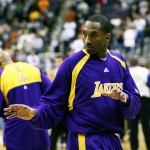In the past week, two very different celebrity athletes from two very different arenas have had one very similar experience – at least through my eyes.
Kobe Bryant and Peyton Manning, both retiring athletes in their late-30s, are experiencing a small heyday as their careers come to a close. Manning just won his second-career Super Bowl with the Denver Broncos while Bryant is on a monthslong international farewell tour with the Los Angeles Lakers as he prepares to say goodbye to the NBA.
As these two men make headlines around the world for their game-changing contributions over yearslong careers, darker and less laudatory stories lurk in the shadows. Both Bryant and Manning have sexual assault claims against them dating back two decades – both which the men have severely downplayed over the years.
Following Manning’s Super Bowl win Feb. 7, new details emerged regarding multiple altercations he had as a student-athlete at the University of Tennessee with one of the associate trainers, Jamie Whited – after her divorce, Jamie Naughright. Naughright references two separate incidents, one in 1994 and one in 1996, that were downplayed by the school administration as Manning went on to be a Heisman runner-up and the top pick of the 1998 NFL Draft. Naughright holds that a 19-year-old Manning exposed himself to her while she was trying to treat him for a foot injury in 1996, an interaction Manning later described in a memoir he co-wrote with his father as “crude maybe, but harmless.”
Less talked about but ever as prevalent, Bryant was accused in 2003 of raping a 19-year-old employee of Colorado’s Lodge and Spa at Cordillera. Then 24 years old, Bryant was in town preparing to undergo knee surgery and had been married for two years. The 19-year-old ended up refusing to testify and while Bryant admitted to adultery, he maintained the encounter was consensual and therefore was not assault. His marriage survived, but his reputation never recovered – or at least, so I thought.
Like any other basketball fan, I tuned into TNT intermittently over the weekend to take in the NBA All-Star Weekend festivities. Preceding the main event of the three-day expo – the All-Star game itself – Laker legend Magic Johnson paid tribute to Bryant as a role model to younger players in the league and one of the best competitors in NBA history.
Bryant entered the NBA 19 years ago straight out of high school as a 17-year-old. Admittedly, the onslaught of fame and fortune while being a developing teenager hardly set him up for a scandal-free career, but the culture surrounding high-level American sports also contributes to these episodes by allowing athletes to act above the law and get away with it. Case in point, Manning’s transgressions are supposedly symptoms of an endemic issue at Tennessee regarding its treatment of student-athletes. Naughright listed up to 33 players she believed had acted inappropriately toward her over a two-year period stretching from 1994 to 1996.
Similar statements have been made lately regarding the much-maligned Johnny Manziel, the former Texas A&M football standout now being investigated for domestic abuse. Former Texas A&M quarterback Kyle Allen, who transferred following his freshman season, said that Manziel played off the culture present at the school in which extreme partying and misbehavior were accepted as part of the deal.
“I think the culture was a big part of (my decision to leave), and I think that stems from Johnny’s era there – the way that they let Johnny and (others) act there,” Allen told CBS. “They (could) do that and still win games because they had Johnny … and five offensive linemen playing in the NFL right now.”
In the past two weeks, we have lauded Peyton Manning and Kobe Bryant as arguably the greatest of their respective generations. But what does it mean to truly be great? I’m no proponent of moral absolutism – the world is far from black and white. What I do believe is that if these players do want to be remembered as great, they need to come clean and own up to their mistakes instead of hiding behind their successes. Bryant might have apologized for adultery, but he has yet to publicly acknowledge the full extent of his wrongdoing.
Both Bryant and Manning are lauded for changing the game – they could change the game in more ways than one if they use their admissions to change their respective leagues’ approaches to sexual assault.
